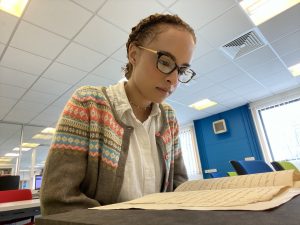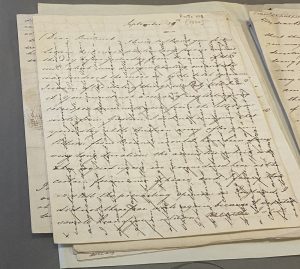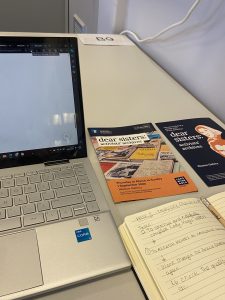April 23, 2024, by Kathryn Summerwill
Handling History – a recent archive placement
This is a guest post by Jessica Reynolds, who volunteered at Manuscripts and Special Collections between February and March 2024, as part of the Faculty of Arts placement scheme.
Working as a volunteer at the University of Nottingham’s Manuscripts and Special Collections felt like working as a Detective! Whilst on the Arts Faculty Placement module, I received the opportunity to work on the Portland family collection – handling history itself – and jumped up at the idea.
For 8 weeks, my work entailed deciphering letters that were sent to Lord William Bentinck, son of the 3rd Duke of Portland, between the 1790s and the early 1800s. Concerning one of Britain’s historically significant aristocratic families of the time, the letters held grand military importance in this period of strife and anxiety following the French Revolution and leading up to the Napoleonic Wars. Correspondence from people such as the 3rd Duke of Portland (Prime Minister 1783 and 1807-1809), Lords, Dukes, Colonels and military personnel alike were included in the pile of letters, all with differing concerns and all with incredibly personalised handwriting styles.
Summarising Letters and Family Research
This was one of the more challenging tasks. It involved going through the letters and getting used to the individual’s particular way of writing. Cross-written letters were by far the most exotic style of letter-writing I had come across. This was a common way of writing a letter, starting by writing normally and getting to the end of the page before writing all over the page again perpendicularly! As you can imagine, the words turned into patterns making it hard to read the first time, however, it was all about focusing the eyes. With practice, I quickly got the hand of certain writing styles, making summarising a lot quicker. Individual research was one of my favourite aspects of this role. With lots of guidance from my supervisor Kathryn, we would have daily conversations and she made sure to always check up on me, being readily available to answer any questions I had. She showed me the abundance of useful online sites as well as the large inventory of books relating to aristocratic families that are kept in the Manuscripts and Special Collections Reading Room. All the material was readily available for me to do all the necessary research into the names and historical events that were written into the letters. This gave me a necessary scope of the context of the time that I felt helped me understand the letters greatly more.
Additionally to this, I got a taste for conservation and special collections handling training that highlighted the specific conditions that are required to preserve the collections including regulated temperatures, acid-free storage and special care when handling.
Greatest takeaway
The greatest takeaway I got from working at Manuscripts and Special Collections was the importance of archive work in handling and conserving historical documents. The team play a crucial role in making sure that that original sources are preserved to make original unedited documents of history accessible to everyone, allowing the freedom of knowledge. As an undergraduate student of Archaeology, I feel working there really helped me tailor my research skills and really improve my eye for detail! Most importantly to me was how much I thoroughly enjoyed engaging with the letters and understanding more about the person behind the historical documents. Plus, meeting the people I worked with and around at Manuscripts and Special Collections.
A biography of Lord William Bentinck is available on our website, and catalogue descriptions of his papers (Pw J) are on our Manuscripts Online Catalogue. If you’re interested in viewing original papers, you can visit the Manuscripts and Special Collections Reading Room. To find out more, or to book an appointment, please contact us at mss-library@nottingham.ac.uk.
No comments yet, fill out a comment to be the first




Leave a Reply